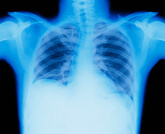 Lung Cancer is the number one cause of cancer deaths in the United States, killing more people than breast, colon and prostate cancer combined. An average of 160,000 Americans each year will lose their battle with lung cancer.
Lung Cancer is the number one cause of cancer deaths in the United States, killing more people than breast, colon and prostate cancer combined. An average of 160,000 Americans each year will lose their battle with lung cancer.
Early detection is the key to prolonging life. Jeffrey Kern, MD, director of the Lung Cancer Center at National Jewish Health notes, “We need to enhance screening to detect a greater number of early-stage lung cancers. That is the patient’s best chance of a cure.”
When lung cancer is diagnosed in its earliest stages, the five-year survival rate is 70-80 percent.
Learn about clinical trials for lung cancer.